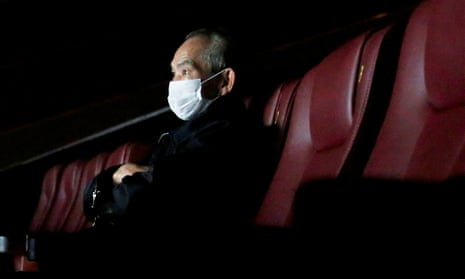The UK’s largest cinema chain says fears over the spread of coronavirus have not yet significantly impacted ticket sales, despite a 20% fall in its shares over the past two days.
Following news on Wednesday that the release of new James Bond film No Time to Die would be pushed back from April to November, Cineworld’s shares fell 13%.
A further 7% decline was registered on Thursday as concerns continued to grow, leading to some analysts suggesting that globally there would be a minimum loss of $5bn on the film industry.
Meanwhile AMC, the world’s largest cinema chain, has seen a 30% drop in shares over the past fortnight.
A spokesperson for Cineworld, which owns multiplexes throughout Europe as well as UK arthouse chain Picturehouse Cinemas, pointed to the fact that most releases remain on track, with studios apparently reluctant to change schedules unless it becomes absolutely necessary.
“Admissions remain high,” Phil Clapp, chief executive of the UK cinema association told the Guardian. “In line with the advice given by the deputy chief medical officer this week, all sites will remain open,” he said.
A similar defiance was demonstrated by the Cannes film festival, which said it remained committed to proceeding as planned in mid-May.
On Thursday, the French government extended a ban on public gatherings of more than 5,000 people until the end of May.
“[These] instructions don’t concern the festival,” a spokesperson said, “as we are never more than 5,000 in one enclosed space. As of today, nothing indicates the festival will not take place.”
“It’s a confidence thing,” one industry source added. “You can’t start saying you’re worried. It has to be very on until it’s suddenly very off. In part, that’s just a legal and insurance thing.”
More than 12,000 delegates attended Cannes last year, but the largest cinema at the Palais des Festivals seats only 2,300. Invitations to the Cannes lineup press conference in Paris on 16 April were sent out on Friday morning.

No mention was made of any uncertainty; instead the invite noted that “accreditations continue at an intensive pace” as requests are up 9% from last year.
Cannes regained credibility as a launchpad when three of its 2019 premieres – Parasite, Once Upon a Time in Hollywood and Portrait of a Lady on Fire – performed well during awards season.
This followed a couple of underpowered editions for the festival in which its programme was overshadowed by Cannes film festival director Thierry Frémaux’s row with Netflix, whose films he barred from awards eligibility.
Pressure on festival directors not to skip a year would therefore be considerable, despite both unsettling government advice and increasing industry precedent.
On 4 March, organisers of the Cannes MIPTV content market – which also takes place in the Palais – announced they were cancelling this year. Forty of France’s cinemas have been closed and the number of confirmed cases in the Cannes area has reached double figures.
More than half of Italy’s cinemas are closed and regulations prohibit people from sitting less than a metre away from each other in public.
Mario Lorini, president of ANEC, the national association of exhibitors, has unveiled a system he hopes would comply and enable cinemas to remain open: allowing the booking of every third seat in a row, with empty seats directly in front and behind.
Lorini said his team had been “working round the clock” to try to make the plan viable.
On Friday the International Indian Film Academy Awards were postponed because of “sensitivity” over the mounting health crisis. Originally due to take place on 27 March, the annual gala is Bollywood’s version of the Oscars.
The inaugural Red Sea international film festival in Jeddah, Saudi Arabia, was cancelled earlier in the week, and increasing numbers of attendants – including Amazon and Apple – have withdrawn from the South by Southwest (SXSW) festival in Austin, Texas. SXSW has a significant film sidebar, and is still scheduled to take place for 10 days from 13 March.

But it is the mainstream end of the film industry which is likely to be hit hardest by the spread of coronavirus, while smaller films and streaming sites such as Netflix could be set for an unexpected boost.
MGM’s decision to delay the release of the Bond film was applauded by many, despite a potential $50m bill to cover logistics – as well as costs and share falls for the many sponsors whose tie-in campaigns have already begun.
Momentum was built by the release of Billie Eilish’s theme song last month, as well as a $4.5m Super Bowl advert, that will be chalked up to long-lead brand awareness. Had MGM stuck to its original date, estimates suggest that there would be a minimum 30% reduction to a global box-office take that was anticipated to top $1bn.
In earmarking an alternative window quickly, the studio has bought dominance over a key date in the cinema-going calendar – No Time to Die opens in the US over Thanksgiving weekend – while the seven-month hiatus allows time to redraw plans.
“That feels like a safe amount of breathing room,” said a source close to the production. “Tentpole movies live or die on large audiences going out of their houses and watching them in cinemas with hundreds of other people. Right now, nobody wants to do that.”
“In China infections seem to have peaked but you can’t see them opening cinemas before June,” said another industry insider, “nor people being keen to go for a while after that. Add three months for the rest of the world and November starts looking very attractive.”
Widespread cinema closures across China, Hong Kong, Italy, Japan and South Korea have already done drastic damage to the global box office, with one consulting firm suggesting that the loss during China’s new year holiday alone amounts to around $1bn.
Among projected big-hitters yet to be released in China’s 70,000 screens are Dolittle, Sonic the Hedgehog and Oscar contenders such as 1917, Marriage Story, Jojo Rabbit and Little Women. When cinemas do reopen, the backlog will cause further delays and local titles will be prioritised.
Bond’s distributors did not directly mention coronavirus in their Wednesday statement, instead saying that the decision had been taken after “careful consideration and thorough evaluation of the global theatrical marketplace”.
Two-thirds of the money made by Bond movies comes from outside the US, with east Asia increasingly courted by Hollywood producers.

Forthcoming blockbusters such as Mulan – whose $200m budget makes it Disney’s most expensive live-action remake yet – and the ninth Fast and Furious film are highly reliant on Asian markets for their profits.
The Chinese premiere of Mulan was cancelled some weeks ago and updates are anticipated from Disney on any changes to the worldwide launch, which is currently still scheduled for 27 March.
Early estimates suggest that Mulan’s US opening weekend may still manage a $90m take, with some crediting coronavirus’s reportedly less dramatic impact on children as one reason that family films may not suffer as much as their adult counterparts.
How Mulan fares will have substantial implications for the strategy surrounding Disney’s first blockbuster of the year: Avengers spin-off Black Widow, which is meant to open worldwide at the start of May.
Should these films flop, many forecast a domino effect as studios scramble to reschedule tentpole releases. F9, Scooby-Doo movie Scoob!, Wonder Woman 1984 and Netflix’s Eurovision movie are all early summer releases whose release dates look vulnerable.
Production disruption is already considerable, with Paramount halting a planned shoot in Venice on Mission: Impossible VII last week citing “concerns of the crew”.
“Who is going to underwrite a movie which goes into production next week?” queried one source. “If an actor is due on set in say, late March, their agent might well forbid them from working, saying it’s too dangerous.”
Nervousness was demonstrated by talent agency CAA on Wednesday when it clamped down on anything other than virtual meetings. The same day, Sony Pictures’ offices in London, Paris and Poland were shut for the remainder of the week after a UK employee was feared to have been exposed to the virus while travelling abroad.

Paramount is, however, pressing ahead with the release of the sequel A Quiet Place Part II on 20 March. Just a 10th of the original film’s $340m take came from China; the curious parallels between the plot – a family self-isolates to try to survive – perhaps boosting its box office appeal among populations relatively unaffected by illness.
Contingency plans for mid-range releases may involve fast-tracking them to streaming services, where there is likely to be a substantial appetite from a captive at-home audience.
Water-cooler titles such as Promising Young Woman – in which Carey Mulligan feigns drunkenness on nights out before taking bloody revenge on men who attempt to take advantage of her – are thought to be prime candidates for films that could do well online, if a cinema release appears optimistic.
However, legacy inertia could make such innovation challenging. “The ecosystem of release strategies would be really damaged by that kind of thing,” said one source. “Everything is booked and lined up already. I don’t know if that tactic has real financial merit.”
The industry’s structural makeup may also prove problematic, with studios and exhibitors prizing competition over collaboration, meaning strategy communication is limited.
“It’s uncharted territory,” said one source, “but that also means there are lots of opportunities out there if streamers can move quickly.”
Representatives for Netflix and Amazon did not respond to the Guardian’s requests for comment, but a boom in users and dwell time over the coming weeks appears likely.
Even long-established studios are seeing silver linings online. Contagion, Steven Soderbergh’s unfortunately prescient 2011 thriller about the global outbreak of a deadly virus, has proved such a viral hit over recent weeks that it’s already Warner Bros’ second-best-performing film of 2020.
